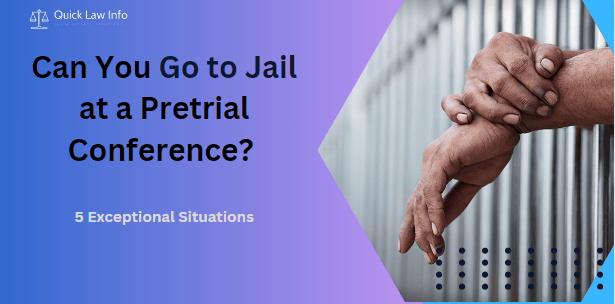No, you typically do not go to jail at a pretrial conference. A pretrial conference is a legal proceeding that occurs before a trial, during the pretrial phase of a criminal case. Its primary purpose is to facilitate communication between the parties involved, such as the prosecution and defense, and to address various issues related to the upcoming trial.
During a pretrial conference, matters such as plea negotiations, discovery of evidence, potential witness lists, and other procedural aspects of the case are discussed. It is a stage in the legal process where both sides gather information, assess the strength of their cases, and attempt to resolve before going to trial.
Generally, authorities do not typically send someone to jail as an outcome of a pretrial conference. Instead, if a defendant is already in custody, they might stay in jail until their trial unless they receive bail or bond release. However, decisions regarding bail or pretrial detention are typically made at separate hearings, not during a pretrial conference. The purpose of pretrial conferences is to facilitate the efficient and fair resolution of the case without prejudicing the defendant’s rights.
5 Exceptional Situations When You Can Go To Jail At Pre-Trial Hearing

However, there are exceptional situations where someone might face the risk of jail during a pretrial hearing:
1. Contempt of Court
If you act up or disrespect the judge at the conference, you could be held in contempt of court. This means you might get fined, punished, or even jailed for things like interrupting, disobeying the judge, or being rude. It’s important to be polite and respectful to keep the court running smoothly and fairly.
2. Outstanding Warrants
If you have an arrest warrant and go to the conference, the police might arrest you right there. They’re legally obligated to do this if they find out about the warrant. It’s crucial to deal with any legal issues before attending the conference to avoid getting arrested.
3. Breaking Release Rules
If you’re out on bail with specific rules (like not contacting someone), breaking those rules during the conference could lead to you being arrested again. The court sets these rules to make sure you follow the law while your case is ongoing. Ignoring them shows you’re not following the court’s orders, which are important for keeping things fair and safe.
4. Running Away (Flight) Risk
If the court thinks you might try to escape to avoid your trial, they might keep you in custody during the conference. This is more likely if you’ve missed court appearances before or have the means to leave the area.
5. Putting Others in Danger
If you act aggressively, threaten people, have weapons, or break the law at the courthouse, you could be arrested immediately to protect everyone else’s safety. Remember, courtrooms are for legal matters, not causing trouble. of Release Conditions.
The Bottom Line
While jail isn’t the typical outcome of a pretrial conference, these exceptions serve as important reminders. Be respectful, address any legal issues beforehand, and prioritize your court appearances. After all, the goal is a fair and efficient trial, not an unexpected trip to jail.
FAQs For Can You Go to Jail at a Pretrial Conference?
Q: I have a pretrial conference for my criminal case. Will I go to jail?
A: In most cases, no, you won’t go to jail at a pretrial conference. This meeting focuses on preparing for your trial, not determining guilt or innocence. However, there are rare exceptions.
Q: What should I do to avoid getting jailed at a pretrial conference?
- Be respectful and polite.
- Clear any outstanding warrants beforehand.
- Follow all release conditions strictly.
- Appear in court as scheduled.
- Consult a lawyer for guidance and representation.
Q: Do I need a lawyer for a pretrial conference?
A: It’s highly recommended. A lawyer can advocate for you, ensure your rights are protected, and prepare you effectively for the conference and trial.
Q: What should I wear to a pretrial conference?
A: Dress professionally and conservatively to show respect for the court.
